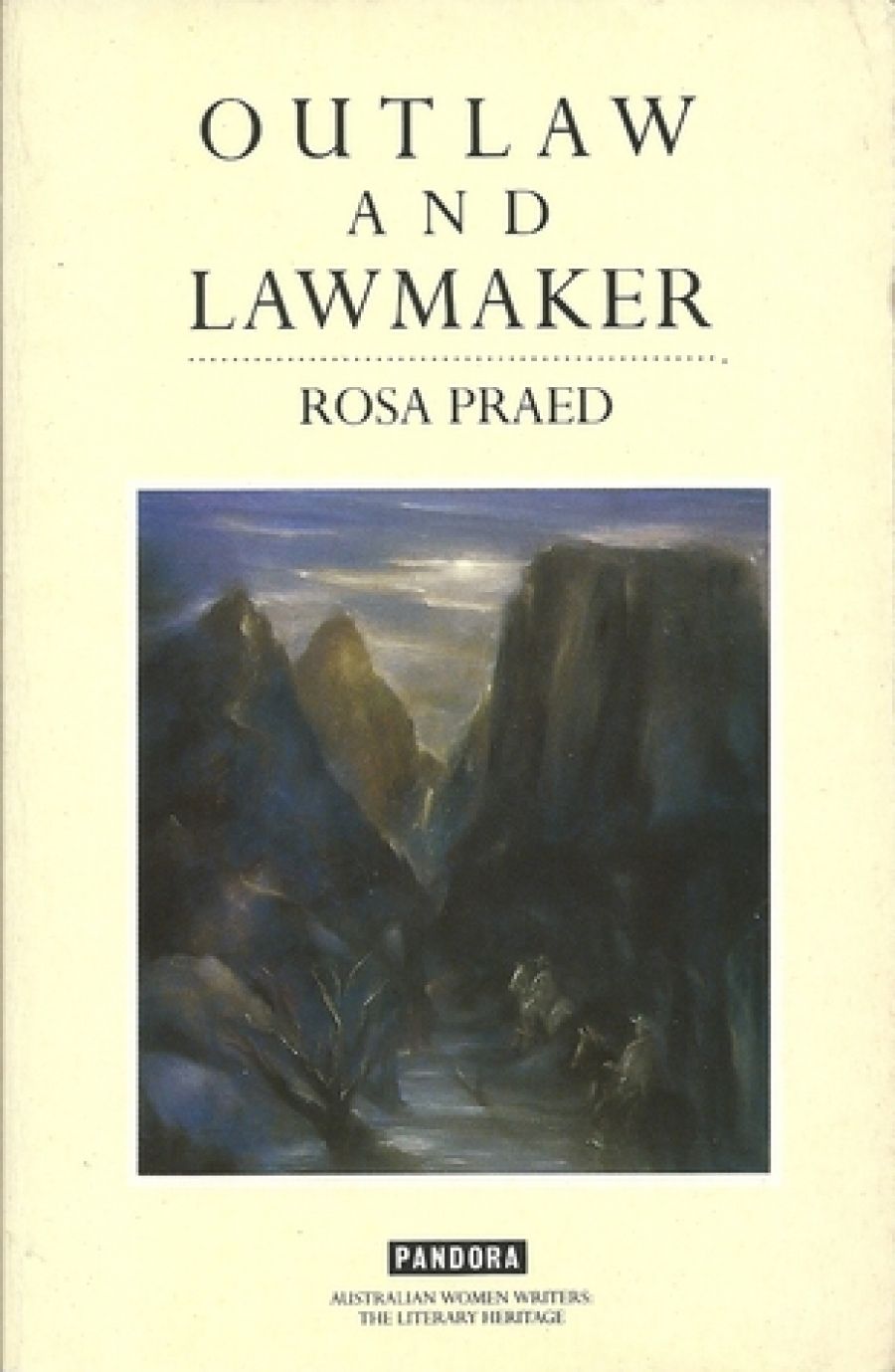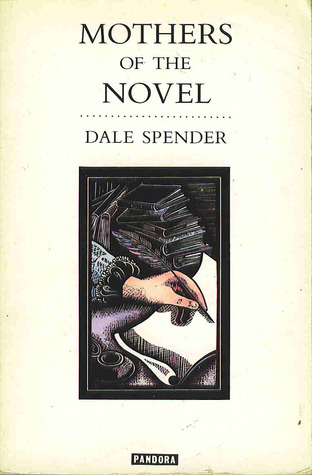
- Free Article: No
- Contents Category: Fiction
- Review Article: Yes
- Article Title: Humanism plagues feminist criticism
- Online Only: No
- Custom Highlight Text:
I first met Rosa Praed under the blue dome of the British Museum Reading Room some twenty years ago. She was introduced as Mrs Campbell Praed, an aspiring novelist advised by George Meredith – himself a novelist and poet, and the subject of my doctoral research – in his capacity as publisher’s reader for the well-known house of Chapman & Hall. The fact of her being an Australian writer seeking to break into the London publishing scene in the 1880s was notable; but she was marginal to my concerns at that time.
- Book 1 Title: Outlaw and Lawmaker
- Book 1 Biblio: Pandora Press, 307 pp, $13.95 pb
- Book 2 Title: Mothers of the Novel
- Book 2 Subtitle: 100 good women writers before Jane Austen
- Book 2 Biblio: Pandora Press, 357 pp, $14.95 pb
- Book 2 Cover Small (400 x 600):

She turned up again in the course of my work on Meredith, whose novel Diana of the Crossways (l885) contributed to debate on ‘the woman question’ carried on both in fiction and in the press during the end of the 1890s. Rosa Praed in her writing was actively engaged in this debate, taking on issues to do with the sanctity of marriage and other social pressures which keep women dependent. Such works as The Bond of Wedlock (l887) form part of a heated dialogue in which both women and men were participating. It did not occur to me during my passing acquaintance with Rosa Praed in the 1960s, but it seems pertinent now to see that though Rosa Praed in significant respects is to be read as writing on behalf of women’s interests, she was not writing only to women. Her achievement is diminished if she is simply claimed as a neglected woman writer, distinguished by considerations of gender alone.
The nature of Rosa Praed’s achievement is briskly and enthusiastically sketched in Dale Spender’s introduction to Outlaw and Lawmaker. Dale Spender is also the general editor of Pandora’s Australian Women Writers: The Literary Heritage series; she has earned hearty thanks for her entrepreneurial energy in this enterprise.
But provision of primary materials is only the beginning, as she indicates in Mothers of the Novel: ‘if we are to have any appreciation of women’s literary heritage we must reclaim and study those writers who have been lost’. I qualify this declaration: in my view, ‘women's literary heritage’ (heritages?) is to be established in a context which includes and transforms the canonical male traditions. Germaine Greer is more emphatic:
It is impossible to study work by women without registering the degree to which they were steeped in works by men. Operating against gynocritics is the fact that evaluating minor writers takes double time. (TLS, June 3-9, 1988).
Here is the vexed question of evaluation; and one of the disappointments of Mothers of the Novel is that the criteria by which ‘100 … women writers before Jane Austen’ were judged ‘good’ seem to be those of a fairly orthodox humanist criticism.
This is not the occasion for a disquisition on the possibilities for feminist criticisms, though it can be an opportunity to propose that reading can be enriched by sensitivity to considerations of gender and impoverished by too exclusive a concentration on them. Outlaw and Lawmaker provides a case in point.
It is a wonderful gothic romance, and like most such work a fine sensational read which yields further pleasures to a reader prepared to acknowledge the multiple capacities of romance. Let me make clear that I am in no doubt of the capacity of Outlaw and Lawmaker to enthral readers in the late twentieth century. Like all powerful romance, it forces the reader to suspend disbelief, even for passages like:
Elsie sobbed all night the sobs of outraged maidenhood. He had conquered. She knew it too well. His kisses burned on her lips, and the burning was sweet agony. She loved him; but – and here came the hideous doubt – did he love her?
The answer, of course, is yes: but he loves honour more.
The ‘he’ in question is the outlaw and lawmaker of the title, the Irishman Morris Blake, alias the bushranger Captain Moonlight. The heroine, Elsie Valliant, is inexorably attracted to him, responding to the passionate lover within the successful Leichhardt’s Land politician. Their love is a wild passion which flourishes outside of civilization, in the savage outback, but which is known and documented in the civilised world. Elsie is reading Goethe’s Elective Affinities on the page before her meeting with Blake, and their encounter brings to her mind an explicit recollection of Jane Eyre’s meeting with Rochester. Another great literary love story, that of Henry Esmond, is elsewhere alluded to. Of these intertextualities, the most relevant is the modification of Jane Eyre, for Elsie is not empowered by her love as Jane is. Elsie is not quite ravished on numerous occasions, and is in the end punished.
Elsie is a flirt, with two broken engagements behind her, now sought in marriage by a stolid young Australian (a Frank: Rosa Praed enjoys naming). She has near-misses with Lord Astar, visiting in the retinue of an English prince, and with Blake’s partner, another Irishman, Dominic Trant. It is Trant who in an amazing sequence lures her to Moonlight’s hideout, an inaccessible but fertile crater, with a convenient set of caves for accommodation. The cover illustration (nicely judged as with all these Pandora volumes) shows awareness of the Freudian nuances of the setting for this narrative climax.
Trant holds Elsie prisoner for three days, until Blake arrives to rescue her. The relationship of Elsie and Blake has been in effect consummated by their fierce kisses during a corroboree, but in the sequence in the hideout Blake really gives himself to Elsie in acknowledging his dual identity and entrusting her with the reason for his bushranging activities. For he is of an aristocratic family – indeed, he turns out to be the last Baron Coola – and has espoused the Fenian cause against English domination of Ireland. There is a fascinating nexus of anti-establishment positions here connecting women, the Irish and the workers as groups oppressed – and repressed – by English paternalism. The realms of the lawmaker’s rational order and the outlaw’s passionate energies can co-exist. The narrative celebrates the illicit potency of passion only to end with a restoration of civilised convention. Blake, having surrendered himself to Elsie, throws himself over a precipice rather than surrender to the troopers. Elsie survives, sentenced to broken health and residence abroad – for the energy and openness of Australia are after all to be valued above the decadence of the Old World.
There is much more in Outlaw and Lawmaker. I am contending only that in this novel, gender and its power struggles (including, treacherously to the feminist cause, the wicked pleasures of helplessness) are inseparable from the power struggles of class, of politics, of nationalism. And for a thoroughly contemporary (1985) defence of romance, have a look at Coral Lansbury’s Ringarra: A Gothic novel.


Comments powered by CComment